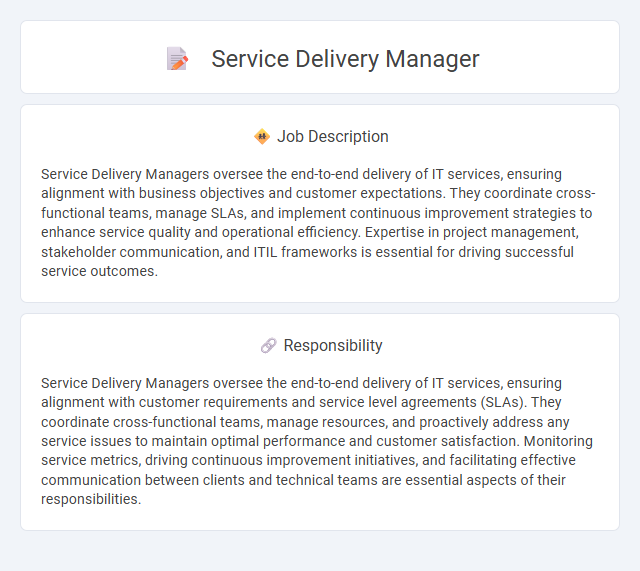
Service Delivery Managers oversee the end-to-end delivery of IT services, ensuring alignment with business objectives and customer expectations. They coordinate cross-functional teams, manage SLAs, and implement continuous improvement strategies to enhance service quality and operational efficiency. Expertise in project management, stakeholder communication, and ITIL frameworks is essential for driving successful service outcomes.
Individuals with strong organizational skills and the ability to manage multiple tasks simultaneously are likely to thrive as Service Delivery Managers. Those who excel in communication and problem-solving, coupled with a high level of adaptability, may find this role fitting due to its dynamic nature and client-focused demands. Candidates who prefer routine and minimal interpersonal interaction might be less suited for the constant coordination and stakeholder engagement required in this position.
Qualification
A Service Delivery Manager typically requires a bachelor's degree in business administration, information technology, or a related field, along with certifications such as ITIL, PMP, or Six Sigma to demonstrate expertise in service management and project delivery. Proven experience in managing client relationships, overseeing service level agreements (SLAs), and coordinating cross-functional teams is essential to ensure optimal service performance. Strong skills in communication, problem-solving, and strategic planning contribute to effectively aligning IT services with business objectives.
Responsibility
Service Delivery Managers oversee the end-to-end delivery of IT services, ensuring alignment with customer requirements and service level agreements (SLAs). They coordinate cross-functional teams, manage resources, and proactively address any service issues to maintain optimal performance and customer satisfaction. Monitoring service metrics, driving continuous improvement initiatives, and facilitating effective communication between clients and technical teams are essential aspects of their responsibilities.
Benefit
Service Delivery Manager roles often bring significant benefits including improved operational efficiency and enhanced client satisfaction through effective coordination and communication. Their strategic oversight probably leads to reduced service disruptions and increased alignment between business objectives and service outcomes. Organizations may experience higher customer retention and cost savings as a result of the manager's proactive problem-solving and performance monitoring.
Challenge
Service Delivery Manager roles likely involve navigating complex client expectations while ensuring seamless service performance, which can pose significant challenges. Managing cross-functional teams and coordinating resources efficiently may frequently test leadership and problem-solving skills. Maintaining high customer satisfaction amid evolving requirements and unforeseen disruptions often requires proactive risk management and adaptable strategies.
Career Advancement
A Service Delivery Manager oversees the efficient delivery of IT services, ensuring client satisfaction and adherence to service level agreements (SLAs). Mastery in project management, stakeholder communication, and process optimization can propel career growth toward senior management roles such as IT Operations Manager or Director of Service Delivery. Continuous skill development in emerging technologies and certification in ITIL or PMP enhances advancement opportunities in this competitive field.
 kuljobs.com
kuljobs.com